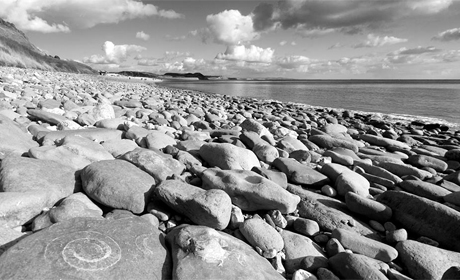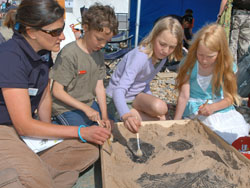Lyme Regis Beaches
Dorset, England

Lyme Regis is a picturesque seaside town set in an area of Outstanding Natural Beauty, on the border where Dorset meets Devon. With a tangle of narrow streets to explore, Lyme Regis is renowned for the famous 13th Century Cobb harbour and a fantastic family friendly beach. The area is world famous for its fossils, which date back to the Jurassic period and several local museums, attractions and shops are dedicated to this geological heritage.

Local scientist and fossil hunter Mary Anning found the world's first ichthyosaur here in the 19th century and the town attracts millions of keen fossil hunters annually hoping that they too may stumble across a worthy find.
The beach and cliffs to the west expose the Blue Formation which is made up of resistant impure limestones, which form bands and ledges, separated by mudstones and thin shales. Beach boulders of limestone contain some very large Coroniceras ammonites. Bivalve fossils are also common in some horizons and include Gryphaea. Some of the beach boulders are derived from the Cretaceous cliffs exposed inland and consist of sandy limestones and cherts.
To the east Church Cliffs again expose the Blue Lias and the overlying Shales with Beef member, the latter is composed of mudstones split by thin calcite bands giving the appearance, supposedly, of a beef steak. Again giant ammonites can be found in the beach boulders along with smaller ammonites such as Promicroceras. Careful searching may also reveal bivalves, belemnites, broken crinoid stems, fish scales and ichthyosaur vertebrae.
All the beaches and cliffs around Lyme Regis are within an SSSI so in situ fossil collecting involving hammering is not allowed.
Text: Howard Colley